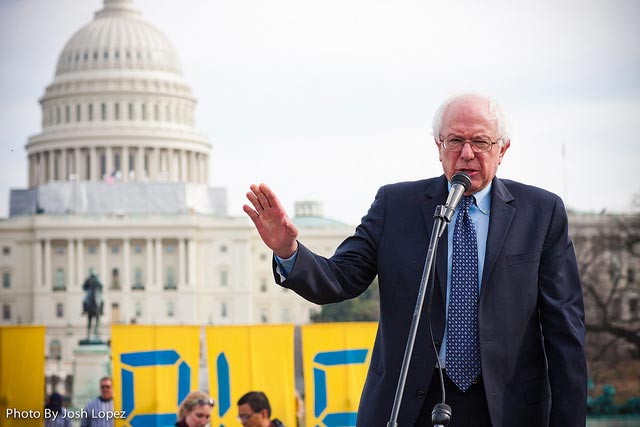
The DC press says it’s getting down to the wire on a possible vote in the House on fast track to substantially pre-approve the Trans-Pacific Partnership and other pending trade deals, with a vote possible as early as Thursday.
Democratic presidential candidate Bernie Sanders, who was a close second in a recent straw poll of Wisconsin Democrats, has called for a “political revolution” to revitalize democracy in the United States.
Is Sanders ready to walk the walk?
There’s a big difference between voting “no” on something and doing everything in your power to stop it. Sen. Dick Durbin voted no on the Iraq war. So he’s innocent, right? You can’t blame him for the war; he was against it. But in April 2007, Durbin gave a remarkable speech on the Senate floor. He said that as a member of the Senate intelligence committee, he had known at the time that the American people were being misled into the Iraq war, that the classified intelligence being given to members of Congress didn’t match the public rhetoric of the Bush administration about the supposed threat to the US from Iraq. But, he said, he kept this information to himself because he was sworn to secrecy as a member of the intelligence committee.
I strongly credit Durbin for giving this speech, but I don’t credit him for the previous inaction that he confessed. It was his job as a member of the intelligence committee to tell the American people that the intelligence didn’t match the Bush administration’s rhetoric. Of course, it was other people’s job too; he was the one who subsequently confessed to inaction. He voted “no” on the war, but he didn’t do everything he could have done, everything he should have done, in order to stop it.
Similarly, House Minority Leader Nancy Pelosi may vote “no” on the TPP. But if the inside DC press is right, she is doing what she can to help the administration get the Democratic votes it needs to pass fast track to enable the TPP. Even if she votes “no,” it will certainly be true that she didn’t do everything that she could do to stop it.
How about Bernie? He voted “no” in the Senate on fast track. But has he done everything he could do to stop it?
Here’s one thing Bernie could do that he hasn’t done: He could publish the text of the TPP.
The administration has kept the TPP text classified. This is an abuse of the administration’s classification power, which is only supposed to be used for secrets whose revelation would endanger our national security. As veteran financial journalist Alan Beattie has pointed out, other international agreements have been open to the public while they were being negotiated, including trade agreements. Moreover, under the precedent established by the ACLU’s FOIA lawsuit over the administration’s classification of the drone strike memos, the administration forfeited its right to keep the TPP text classified when it engaged in a public fight with Sen. Elizabeth Warren over the contents of the agreement. Either the contents are secret or they’re not. To treat them as secret for critics but not for proponents is an anti-democratic abuse of classification power.
Here’s how we know for sure that Bernie hasn’t done something that he could do: because Rep. Darrell Issa published a chapter of the TPP that had previously been leaked. If Issa could do it, Sanders can do it. Three chapters of the TPP have now been published by WikiLeaks, and if WikiLeaks’ reward offer for the remaining chapters is successful, new chapters of the TPP will soon be forthcoming. Sanders could publish these chapters on his website; he could try to read them into the Congressional Record, as Sen. Mike Gravel read the Pentagon Papers into the Congressional Record.
At this writing, nearly 50,000 Americans have signed a joint petition led by 11 national groups calling on members of Congress to do everything in their power to publish the TPP before any House vote on fast track. If you think Bernie Sanders should walk the walk, you can tell him so here.
Press freedom is under attack
As Trump cracks down on political speech, independent media is increasingly necessary.
Truthout produces reporting you won’t see in the mainstream: journalism from the frontlines of global conflict, interviews with grassroots movement leaders, high-quality legal analysis and more.
Our work is possible thanks to reader support. Help Truthout catalyze change and social justice — make a tax-deductible monthly or one-time donation today.